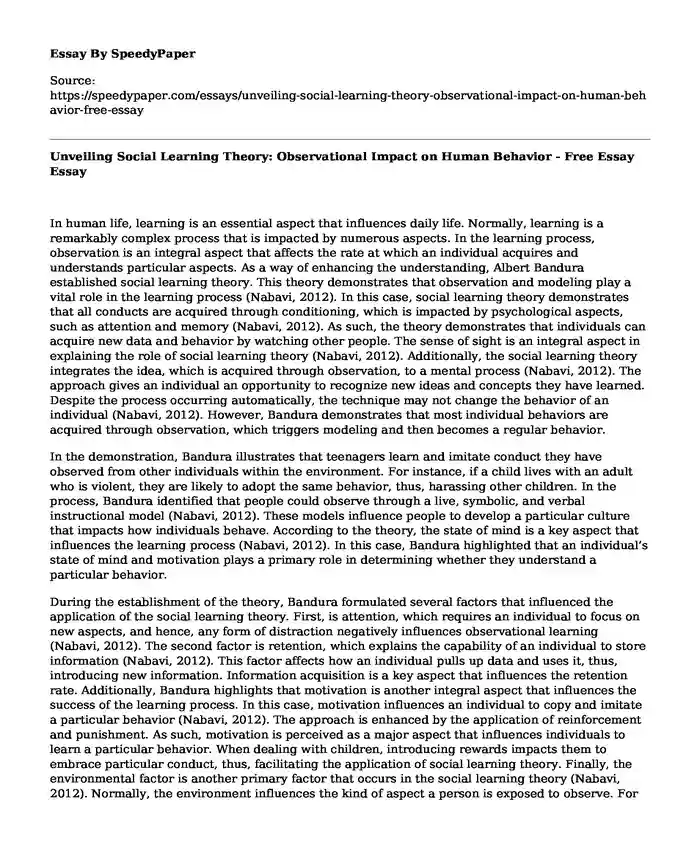In human life, learning is an essential aspect that influences daily life. Normally, learning is a remarkably complex process that is impacted by numerous aspects. In the learning process, observation is an integral aspect that affects the rate at which an individual acquires and understands particular aspects. As a way of enhancing the understanding, Albert Bandura established social learning theory. This theory demonstrates that observation and modeling play a vital role in the learning process (Nabavi, 2012). In this case, social learning theory demonstrates that all conducts are acquired through conditioning, which is impacted by psychological aspects, such as attention and memory (Nabavi, 2012). As such, the theory demonstrates that individuals can acquire new data and behavior by watching other people. The sense of sight is an integral aspect in explaining the role of social learning theory (Nabavi, 2012). Additionally, the social learning theory integrates the idea, which is acquired through observation, to a mental process (Nabavi, 2012). The approach gives an individual an opportunity to recognize new ideas and concepts they have learned. Despite the process occurring automatically, the technique may not change the behavior of an individual (Nabavi, 2012). However, Bandura demonstrates that most individual behaviors are acquired through observation, which triggers modeling and then becomes a regular behavior.
In the demonstration, Bandura illustrates that teenagers learn and imitate conduct they have observed from other individuals within the environment. For instance, if a child lives with an adult who is violent, they are likely to adopt the same behavior, thus, harassing other children. In the process, Bandura identified that people could observe through a live, symbolic, and verbal instructional model (Nabavi, 2012). These models influence people to develop a particular culture that impacts how individuals behave. According to the theory, the state of mind is a key aspect that influences the learning process (Nabavi, 2012). In this case, Bandura highlighted that an individual’s state of mind and motivation plays a primary role in determining whether they understand a particular behavior.
During the establishment of the theory, Bandura formulated several factors that influenced the application of the social learning theory. First, is attention, which requires an individual to focus on new aspects, and hence, any form of distraction negatively influences observational learning (Nabavi, 2012). The second factor is retention, which explains the capability of an individual to store information (Nabavi, 2012). This factor affects how an individual pulls up data and uses it, thus, introducing new information. Information acquisition is a key aspect that influences the retention rate. Additionally, Bandura highlights that motivation is another integral aspect that influences the success of the learning process. In this case, motivation influences an individual to copy and imitate a particular behavior (Nabavi, 2012). The approach is enhanced by the application of reinforcement and punishment. As such, motivation is perceived as a major aspect that influences individuals to learn a particular behavior. When dealing with children, introducing rewards impacts them to embrace particular conduct, thus, facilitating the application of social learning theory. Finally, the environmental factor is another primary factor that occurs in the social learning theory (Nabavi, 2012). Normally, the environment influences the kind of aspect a person is exposed to observe. For instance, living in a violent environment increases the tendency of a child to acquire, such immoral behaviors.
Reference
Nabavi, R. T. (2012). Bandura’s social learning theory & social cognitive learning theory. Theory of Developmental Psychology, 1-24. https://www.researchgate.net/profile/Razieh_Tadayon_Nabavi/publication/267750204_Bandura's_Social_Learning_Theory_Social_Cognitive_Learning_Theory/links/545914d90cf26d5090ad007b.pdf
Cite this page
Unveiling Social Learning Theory: Observational Impact on Human Behavior - Free Essay. (2024, Jan 04). Retrieved from https://speedypaper.com/essays/unveiling-social-learning-theory-observational-impact-on-human-behavior-free-essay
Request Removal
If you are the original author of this essay and no longer wish to have it published on the SpeedyPaper website, please click below to request its removal:
- Free Essay Sample on Organizational Design and Development
- Free Essay with the Article Review: Grammar Puss by Steven Pinker
- Adulthood Learning - Book Review Essay Example
- Free Essay: Why Online Learning is Effective
- Essay Example: Inductive and Deductive Reasoning
- The Minimum Conception of Morality - Free Essay
- Money Can Make You Happy - Free Paper Sample
Popular categories





